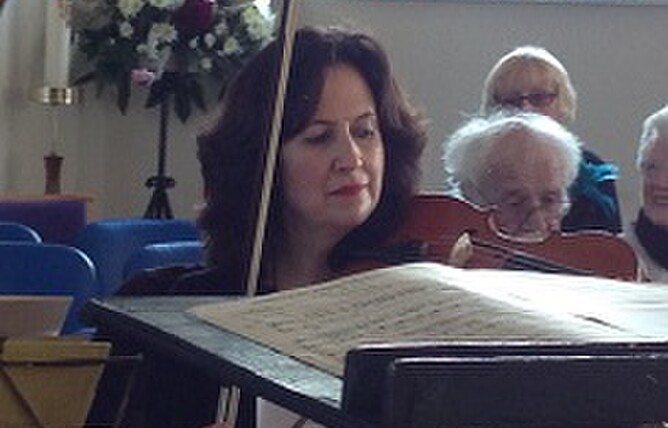Do you know the feeling? The request comes through that you have been dreading. And you think 'Uh oh!'. You know – the one which strikes quiet terror into your heart? The one which will find you out? I was on holiday at the time, using the hotel's lobby wi-fi. And there was the email:
"Dear Jane, Harry has arranged a piece for a string quintet for the summer concert. You are playing viola. I attach the score. The rehearsal will be on…"
Scary right? Perhaps not to you. But I am deaf. OK, so I do play the viola. And I do play regularly in an amateur orchestra. I go to as many rehearsals as I can and ingrain the music in my memory. This means that by the time we get to the concert, I can almost play my part without looking at the music. And that means I can be more aware of the players around me- the violin and cello bows' movement and, of course, crucially, the conductor and stay moderately in time. But a
quintet? Like five people only? No conductor keeping time? That is scary!
But I hadn't played chamber music to an audience for about 25 years, since becoming deaf. Would it work? Would I let everyone – including myself – down? How would it work? Would it work? I sat flicking through the tiny score attached to the email on my phone, attempting to sing in my head the piece which I did not know – another factor taking me way out of my comfort zone: Handel's Messiah? No problem– been there and done that several times before going deaf – lodged in the aural memory. Beethoven's Fifth?- bring it on. But a new piece? Probably written since sound stopped for me? I felt way out of my comfort zone. I felt vulnerable.
If this were a film, things would have magically worked out fine. But the real world ain't so easy: it takes effort – and imagination.
We had a couple of rehearsals and I felt really exposed– there was nothing to go on: the pianist had his back to me. I could see the violinist and cellist but didn't know the music well enough to be able to anticipate what they were doing. I started to panic inside. 'I am letting them down'.
But then I told myself what I would have told my coaching clients 'They have asked you to do this because they trust you to play well enough. You want to do it. Look at all the options and find the best way'. The thing is my deafness is not an issue in the bigger orchestra. Most of the players now know I am deaf, but everyone knows I can play and find a way to navigate things. And a larger group provides 'protection' to an extent. But I realized I would have to brief them and be more assertive in this much smaller group. So I did. I explained that I needed to have a better idea of what was going on with more visual cues. The pianist offered a copy of the score- showing what everyone was playing. That helped and I used this in the concert. Then there was a suggestion that the conductor led the piece – which is unusual, but doesn't actually distract from the music and performance.
On the day the performance was still nerve-wracking, but it went well. Just after we finished Pat, the excellent lead violinist, winked at me knowingly. And the second violinist gave a big smile. I know she had been nervous too. They got it. That meant a lot to me. Several colleagues came up to say well done. It was a good feeling.
But the experience also helped me learn several things which could be applied to anyone:
- We need the chance to make ourselves vulnerable to be able to genuinely develop. (Brene Brown's 'Daring Greatly' brilliantly presents the concept of vulnerability as a strength).
- Chamber music is one of the best examples of real teamwork and leadership. It is based not just on following what one person does but trusting each other at an instinctive level and adjusting/adapting.
- There is usually a way around a 'physical' problem (such as not being able to hear), but psychological barriers are far harder. Sometimes a small adjustment to the way we approach something can open a piece of work to a much wider range of people.
Jane is a Director of Result CIC, a community interest company providing coaching and personal development to marginalised people. Join her on LinkedIn . Follow her on Twitter.
